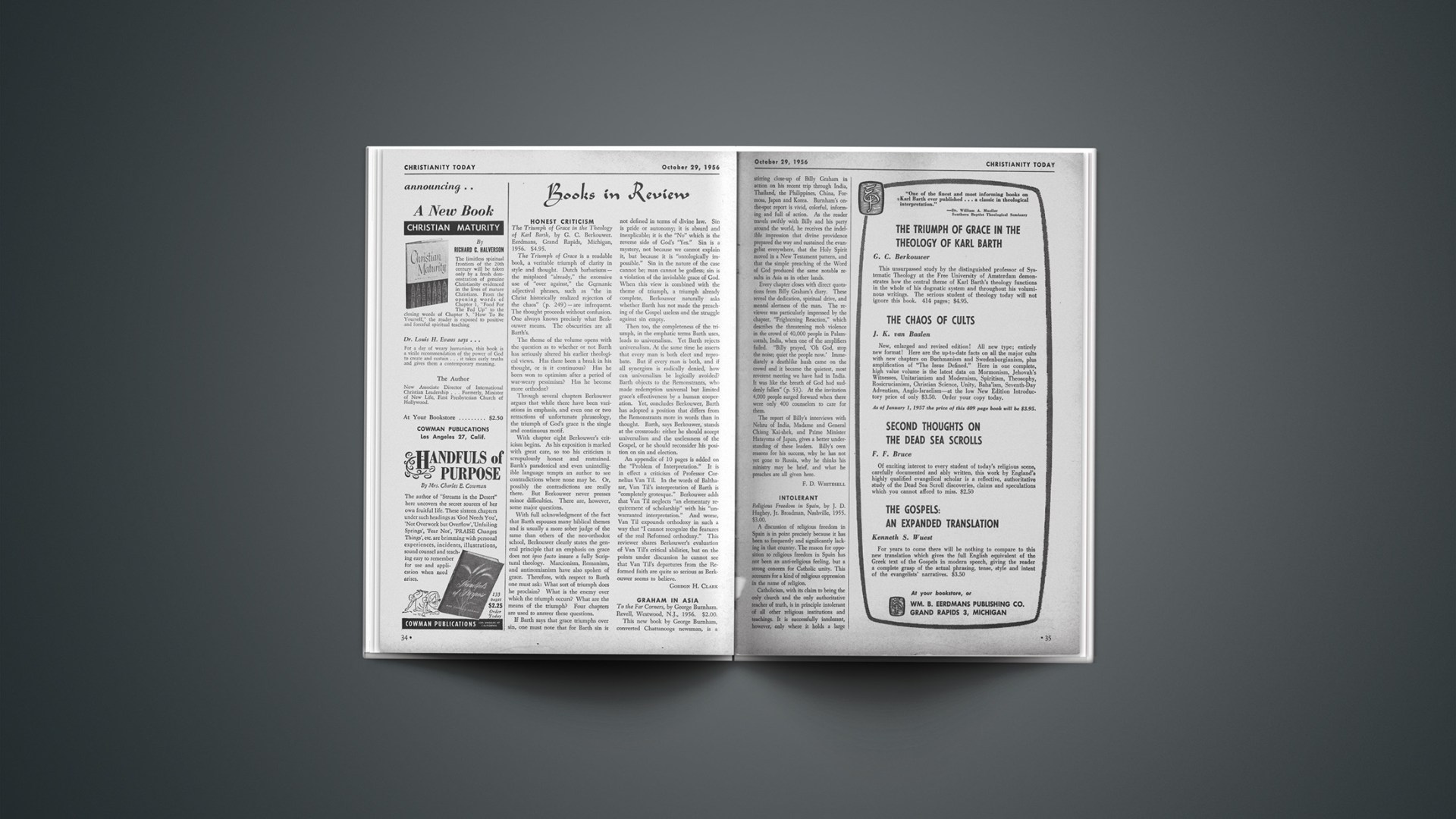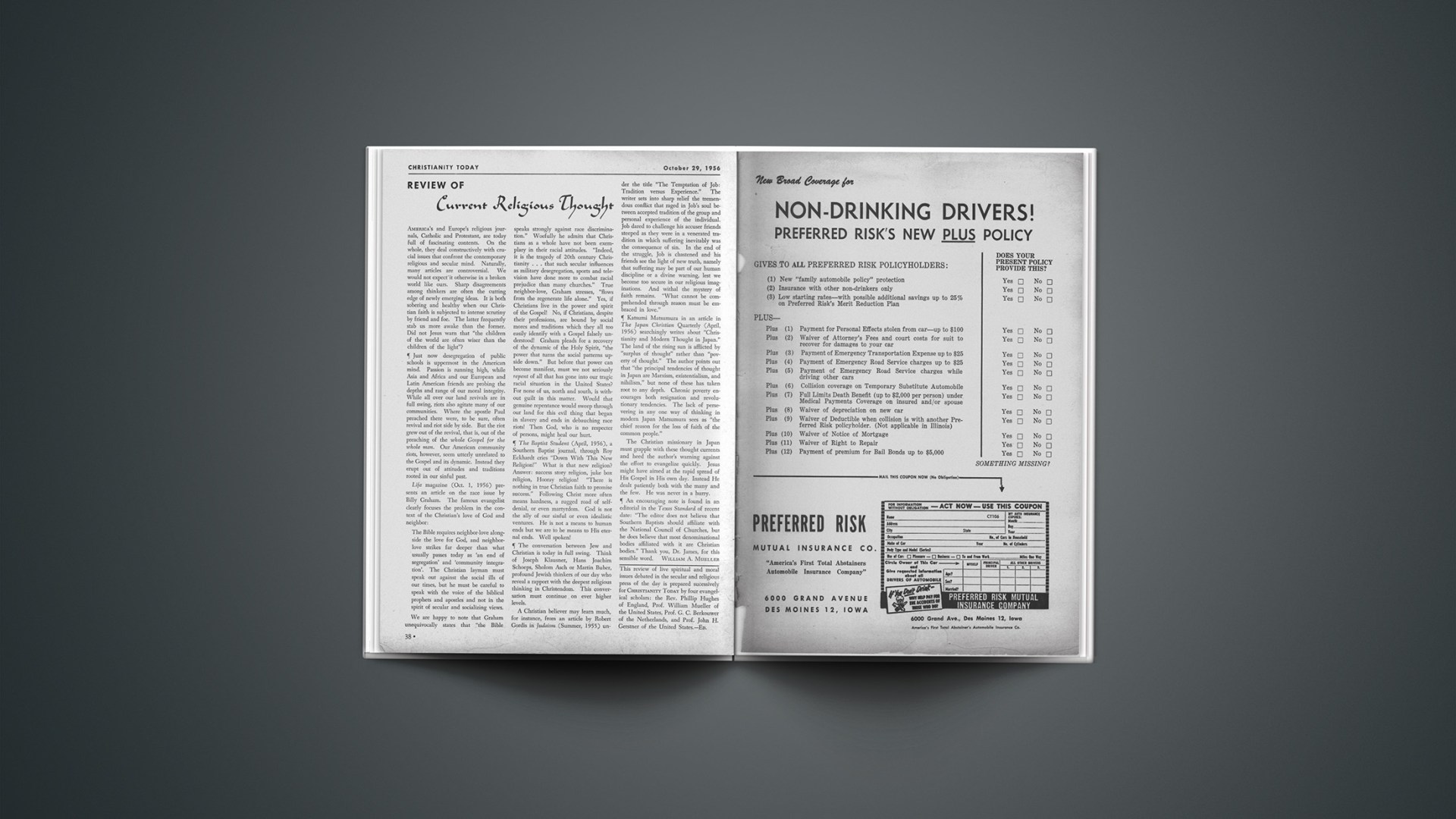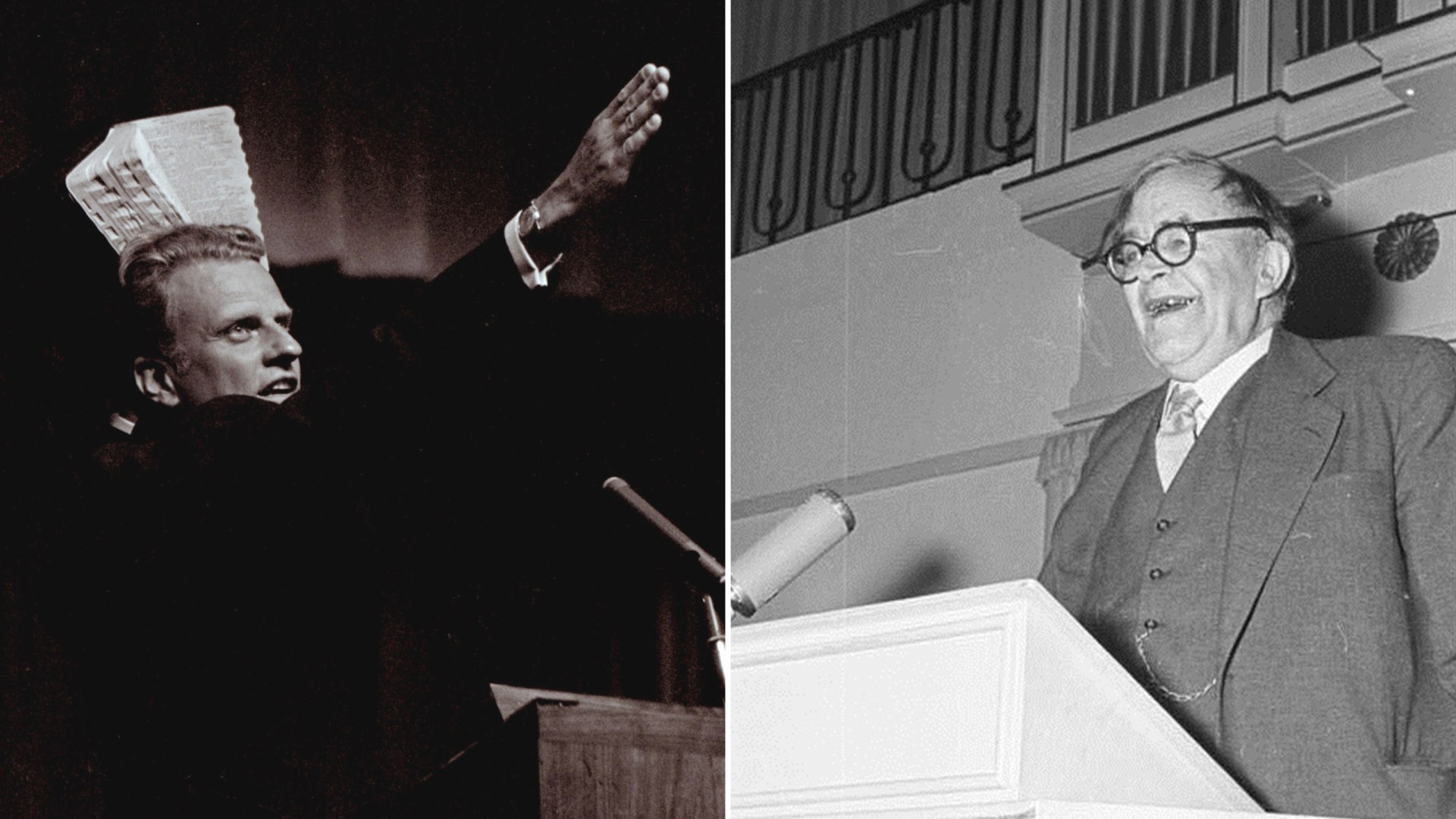Honest Criticism
The Triumph of Grace in the Theology of Karl Barth, by G. C. Berkouwer. Eerdmans, Grand Rapids, Michigan, 1956. $4.95.
The Triumph of Grace is a readable book, a veritable triumph of clarity in style and thought. Dutch barbarisms—the misplaced “already,” the excessive use of “over against,” the Germanic adjectival phrases, such as “the in Christ historically realized rejection of the chaos” (p. 249)—are infrequent. The thought proceeds without confusion. One always knows precisely what Berkouwer means. The obscurities are all Barth’s.
The theme of the volume opens with the question as to whether or not Barth has seriously altered his earlier theological views. Has there been a break in his thought, or is it continuous? Has he been won to optimism after a period of war-weary pessimism? Has he become more orthodox?
Through several chapters Berkouwer argues that while there have been variations in emphasis, and even one or two retractions of unfortunate phraseology, the triumph of God’s grace is the single and continuous motif.
With chapter eight Berkouwer’s criticism begins. As his exposition is marked with great care, so too his criticism is scrupulously honest and restrained. Barth’s paradoxical and even unintelligible language tempts an author to see contradictions where none may be. Or, possibly the contradictions are really there. But Berkouwer never presses minor difficulties. There are, however, some major questions.
With full acknowledgment of the fact that Barth espouses many biblical themes and is usually a more sober judge of the same than others of the neo-orthodox school, Berkouwer clearly states the general principle that an emphasis on grace does not ipso facto insure a fully Scriptural theology. Marcionism, Romanism, and antinomianism have also spoken of grace. Therefore, with respect to Barth one must ask: What sort of triumph does he proclaim? What is the enemy over which the triumph occurs? What are the means of the triumph? Four chapters are used to answer these questions.
If Barth says that grace triumphs over sin, one must note that for Barth sin is not defined in terms of divine law. Sin is pride or autonomy; it is absurd and inexplicable; it is the “No” which is the reverse side of God’s “Yes.” Sin is a mystery, not because we cannot explain it, but because it is “ontologically impossible.” Sin in the nature of the case cannot be; man cannot be godless; sin is a violation of the inviolable grace of God. When this view is combined with the theme of triumph, a triumph already complete, Berkouwer naturally asks whether Barth has not made the preaching of the Gospel useless and the struggle against sin empty.
Then too, the completeness of the triumph, in the emphatic terms Barth uses, leads to universalism. Yet Barth rejects universalism. At the same time he asserts that every man is both elect and reprobate. But if every man is both, and if all synergism is radically denied, how can universalism be logically avoided? Barth objects to the Remonstrants, who made redemption universal but limited grace’s effectiveness by a human cooperation. Yet, concludes Berkouwer, Barth has adopted a position that differs from the Remonstrants more in words than in thought. Barth, says Berkouwer, stands at the crossroads: either he should accept universalism and the uselessness of the Gospel, or he should reconsider his position on sin and election.
An appendix of 10 pages is added on the “Problem of Interpretation.” It is in effect a criticism of Professor Cornelius Van Til. In the words of Balthasar, Van Til’s interpretation of Barth is “completely grotesque.” Berkouwer adds that Van Til neglects “an elementary requirement of scholarship” with his “unwarranted interpretation.” And worse, Van Til expounds orthodoxy in such a way that “I cannot recognize the features of the real Reformed orthodoxy.” This reviewer shares Berkouwer’s evaluation of Van Til’s critical abilities, but on the points under discussion he cannot see that Van Til’s departures from the Reformed faith are quite so serious as Berkouwer seems to believe.
GORDON H. CLARK
Graham In Asia
To the Far Corners, by George Burnham. Revell, Westwood, N.J., 1956. $2.00.
This new book by George Burnham, converted Chattanooga newsman, is a stirring close-up of Billy Graham in action on his recent trip through India, Thailand, the Philippines, China, Formosa, Japan and Korea. Burnham’s on the-spot report is vivid, colorful, informing and full of action. As the reader travels swiftly with Billy and his party around the world, he receives the indelible impression that divine providence prepared the way and sustained the evangelist everywhere, that the Holy Spirit moved in a New Testament pattern, and that the simple preaching of the Word of God produced the same notable results in Asia as in other lands.
Every chapter closes with direct quotations from Billy Graham’s diary. These reveal the dedication, spiritual drive, and mental alertness of the man. The reviewer was particularly impressed by the chapter, “Frightening Reaction,” which describes the threatening mob violence in the crowd of 40,000 people in Palamcottah, India, when one of the amplifiers failed. “Billy prayed, ‘Oh God, stop the noise; quiet the people now.’ Immediately a deathlike hush came on the crowd and it became the quietest, most reverent meeting we have had in India. It was like the breath of God had suddenly fallen” (p. 53). At the invitation 4,000 people surged forward when there were only 400 counselors to care for them.
The report of Billy’s interviews with Nehru of India, Madame and General Chiang Kai-shek, and Prime Minister Hatayoma of Japan, gives a better understanding of these leaders. Billy’s own reasons for his success, why he has not yet gone to Russia, why he thinks his ministry may be brief, and what he preaches are all given here.
F. D. WHITESELL
Intolerant
Religious Freedom in Spain, by J. D. Hughey, Jr. Broadman, Nashville, 1955. $3.00.
A discussion of religious freedom in Spain is in point precisely because it has been so frequently and significantly lacking in that country. The reason for opposition to religious freedom in Spain has not been an anti-religious feeling, but a strong concern for Catholic unity. This accounts for a kind of religious oppression in the name of religion.
Catholicism, with its claim to being the only church and the only authoritative teacher of truth, is in principle intolerant of all other religious institutions and teachings. It is successfully intolerant, however, only where it holds a large enough balance of political power to impose its own religious pattern on a people. In Spain the greatest measure of alliance between Catholic Church and State has been achieved, and it is here that Catholicism has obtained political preference to the prejudice of evangelical churches.
Dr. Hughey, Professor of Practical Theology at the Baptist Theological Seminary in Ruschlikon-Zurich, Switzerland, and for four years a missionary in Spain, gives a competent, thoroughly documented, and enlightening account of the changing fortunes of evangelical religion in this Catholic-dominated country. The origins of Catholic unity are traced to the reconquest of Spain from the Mohammedan Moors by Christians, a process which resulted in a fusion of religion and nationalism. Hughey traces developments through the rise of liberalism, the establishment of religious freedom in varying degrees, and periodic reaction, culminating in the current reaction under General Francisco Franco.
This story indicates that free-thinkers have been very active in the struggle for religious freedom, a fact which provides a Catholic argument against the granting of it. The enforcement of an official religion, however, will rather encourage irreligion. In any event, the Gospel of God cannot be bound, and even in Spain there is religious tolerance. This is no doubt the saving factor for Spain and even for Spanish Catholicism. Religious freedom, as Hughey observes, best serves a whole people, and best serves the cause of religion, including the Catholic.
GEORGE STOB
5,524 Greek Words
Greek-English Concordance to the New Testament, by J. B. Smith, Herald, Scot dale, Pennsylvania, 1955. $12.75.
The sub-title of this volume, “A Tabular and Statistical Greek-English Concordance Based on the King James Version with an English-Greek Index,” indicates rather clearly its functions and scope. As this description suggests, the volume, while basically a Greek concordance, has been prepared with the needs of English readers chiefly in view. The Index lists over 9,700 English translations of the 5,524 Greek words given in the Concordance, and by means of numbers which identify the tables where the Greek terms are found in the Concordance, makes it possible even for the reader of the New Testament who does not know any Greek to take advantage of the information supplied by the Concordance. That interest centers largely in the King James Version also appears from the fact that in the Concordance there is a tabulation of its various English renderings of the individual Greek words. The volume is also of value to the Greek scholar, however, because the tabular arrangement not only easily and quickly discloses the comprehensive use of a word, but also its frequency of usage and its distribution in the several books where it appears.
Most Greek scholars will regret the fact, however, that the Concordance has been based upon the Textus Receptus of the 16th century rather than upon a modern Greek Testament such as Nestle’s.
Students of the Bible who will make regular use of this Concordance will without doubt feel amply rewarded and will be grateful for the indefatigable labors of the author. No tool is more indispensable to the responsible and conscientious student of Scripture than a concordance. For concordances in general, and this one in particular, owe their origin to the conviction that sure results in the area of interpretation are possible only if linguistic usage is consulted. In the case of the study of the Bible the biblical usage is obviously of primary interest and pertinence. In this connection, moreover, it is often highly significant to distinguish the usage of one author from that of another and even the usage in one book from that of another of the same author. The question of the frequency of the usage of a particular word may also be meaningful as one considers the breadth of the basis provided for the consideration of the meaning of the term in any particular instance. The distinctive features of the Concordance of J. B. Smith, accordingly, add substantially to its usefulness as an aid to interpretation. Readers of the Greek New Testament as well as of the King James Version may use this volume to great advantage in acquiring a more exact knowledge of and even fresh insights into the meaning of Holy Scripture.
NED B. STONEHOUSE
Propitiation
The Apostolic Preaching of the Cross, by Leon Morris. Eerdmans, Grand Rapids, 1955. $3.50.
Central in Christian preaching both yesterday and today is the Cross. What is the message of the Cross? Modern biblical theology has raised questions which profoundly affect the preaching of the Cross. Does the biblical concept of the blood of Christ mean life shared or life sacrificed in death? Does the death of Christ effect only expiation of sin or does it also propitiate God? Can a God of love be also a God of wrath? Does reconciliation have to do only with man, or is there a sense in which God must be reconciled? Does justification involve a subjective element? If it is objective and forensic, can such a doctrine play an essential role in biblical theology?
The contemporary study of theology has suggested answers to these questions which deviate from the answers given by the Reformers and classical Protestant orthodoxy. Wrath is said to be unworthy of a loving God who has no need to be reconciled to men. Propitiation of deity is a pagan and therefore unchristian, or at best subchristian, concept. Christ’s death cannot be construed as sacrificial and propitiatory but as the outpouring of his life that men may share its blessings.
Here is a long-overdue study championing the traditional interpretation by the Vice-principal of Ridley College,
Melbourne, Australia. It is not, however, merely a remouthing of old shibboloths, but a fresh, competent linguistic and exegetical study which follows the method made familiar by Gerhard Kittel’s massive theological dictionary. Dr. Morris has already gained wide scholarly recognition in Great Britain by the publication of some of this material in The Expository Times, The Journal of Theological Studies, and The Evangelical Quarterly.
Of outstanding significance is the bearing of Morris’ study on the propitiatory character of Christ’s death. The exegetical conclusions of C. H. Dodd have so widely prevailed at this point that renditions of the K.J.V. and the A.V. at Romans 3:25 have been changed in the R.S.V. from “propitiation” to “expiation.” Probably the average layman is unaware that this change involved a basic divergence in the concept of God himself. Morris fully recognizes the merit of Dodd’s work in dissociating the biblical teaching from pagan ideas of “celestial bribery”; but he successfully demonstrates that Dodd has gone too far in eliminating any idea of propitiation. Morris employs the same technical, philological methodology as that used by Dodd in his influential The Bible and the Greeks. In fact, he demonstrates that Dodd’s conclusions are inadequate because his very methodology needs correction.
GEORGE E. LADD
Christian Existentialist
Kierkegaard Commentary, by T. H. Croxal. Harper, New York. $5.00.
Those interested in the thought of Soren Kierkegaard will find real help in Dr. Croxall’s book. He gives a lucid survey of the contents of Kierkegaard’s writings. The whole picture of the life and labor of the great “Christian Existentialist” stands out in bold relief in this work.
Croxall writes from the point of view of one who has deep sympathy with the object of his research. It is to be hoped that as thorough a study of Kierkegaard as that found in this book may soon be written by some one committed to the historic Christian faith. Something approaching this will soon be made available by the Presbyterian and Reformed Publishing Company. In a book to be titled Modern Thinkers, the evaluation of Kierkegaard’s philosophy by Prof. S. U. Zuidema, of the Free University of Amsterdam, will be made available to English readers. Meanwhile, we are grateful for Croxall’s book.
CORNELIUS VAN TIL












